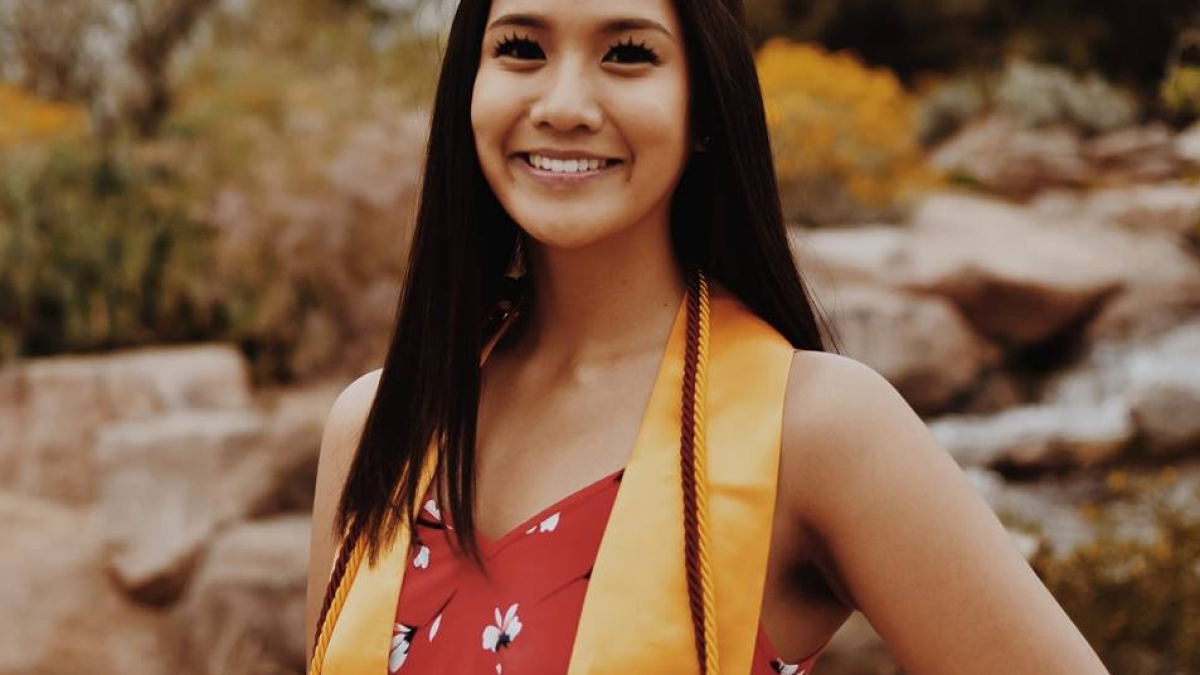Sanford School grad follows her passion for helping families

After graduation, Aira Valera will continue on to her master's degree in marriage and family therapy at ASU. "After that, I aspire to work with families dealing with domestic violence," she said.
Editor’s note: This is part of a series of profiles for spring 2019 commencement.
Aira Valera, a family and human development major in the T. Denny Sanford School of Social and Family Dynamics at Arizona State University, has practical advice about finding the best places on campus, finding your passion and finding yourself.
Question: What was your “aha” moment, when you realized you wanted to study the field you majored in?
Answer: My "aha" moment came much earlier before I was actually willing to change majors. I started out at a child care job during my senior year of high school in which I learned I wanted to work with kids and families. However, due to the pressures of my family, I felt I needed to pursue something in the medical field and started out in speech and hearing science, then later in sociology in hopes of aspiring to be an occupational therapist. All that changed when I took FAS 101 (Personal Growth in Human Relationships) my first semester. From then on, I truly knew family and human development was for me.
Q: What’s something you learned while at ASU — in the classroom or otherwise — that surprised you, that changed your perspective?
A: In my GPH 381 (Geography of Natural Resources) class, I was surprised to hear of all these things that are happening in the environment around us and the time and effort some resources take up. The class completely changed how I looked at the world and made me more environmentally conscious of the resources I use daily.
Q: Why did you choose ASU?
A: I chose ASU primarily because of cost. It was in a commutable distance (she's from Gilbert, Arizona), and I received scholarships and grants that allowed me to graduate debt-free.
Q: Which professor taught you the most important lesson while at ASU?
A: My Intro to Hip Hop professor, My-Linh Le, taught me that I am capable of more than I think. I often doubt myself and have a lot of issues with my confidence, and this dance class has really gotten me out of my comfort zone and helped me to grow. I've seen such an improvement in my confidence compared to when I first started the class.
Q: What’s the best piece of advice you’d give to those still in school?
A: Find the good bathrooms on campus; they're usually in the basements or top floors of buildings. I'm kidding, but also not. The best advice I'd give to those still in school is to study what you want and what will make you happy. For years, I struggled with Filipino culture of being pushed to become a nurse, doctor, lawyer or engineer. It took depression and a bit of therapy for me to realize that I needed to pursue what makes me happy, not what makes my family happy.
Q: What was your favorite spot on campus, whether for studying, meeting friends or just thinking about life?
A: I'm not Mormon, but I love the LDS institute on campus because it is so quiet and everyone is nice there. I took a lot of naps and did homework before or between classes in that building; mainly because I used their parking garage on campus and it was right next to it.
Q: What are your plans after graduation?
A: I'm continuing at ASU to get my master's (degree) in marriage and family therapy. After that, I aspire to work with families dealing with domestic violence.
Q: If someone gave you $40 million to solve one problem on our planet, what would you tackle?
A: Animal agriculture is the second —or first? — largest contributor of greenhouse gas emissions. With $40 million, I would love to fund restaurants and fast food places to start carrying more vegan options and to create more cheap, tasty vegan alternatives to animal-based foods that is on par with or cheaper than the animal-based options. The biggest thing that holds people back from reducing their animal-based foods in their diets is money. Once these alternatives are brought to a cheaper, competitive level will we then see a shift towards more people choosing those options. Once that shift occurs, we will see a great decrease in greenhouse gas emissions, food shortages and even rates of obesity.
More Arts, humanities and education

ASU professor's project helps students learn complex topics
One of Arizona State University’s top professors is using her signature research project to improve how college students learn…

Award-winning playwright shares her scriptwriting process with ASU students
Actions speak louder than words. That’s why award-winning playwright Y York is workshopping her latest play, "Becoming…

Exceeding great expectations in downtown Mesa
Anyone visiting downtown Mesa over the past couple of years has a lot to rave about: The bevy of restaurants, unique local shops…

